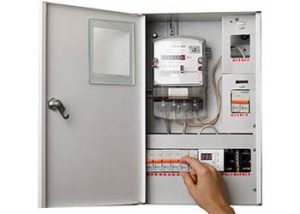What is an overloaded circuit? What causes an overloaded circuit, and why should I be concerned about it?
This month, we are going to try to answer these questions and more. They can cause nuisance tripping of breakers, a fire or other serious safety hazards. We need to know what they are and how to fix them.
First off, an overloaded circuit is when more electrical demand or load is placed on a circuit than it can handle. All of our wiring is, or should be, protected by a fuse or breaker. Each breaker protects one circuit. The wires in that circuit have a maximum amount of current they can safely carry. This is determined by the size of the wire. For example, a circuit wired with copper #12 Romex wire is rated to carry only 20 amps of current. This circuit will be protected with a 20-amp fuse or breaker. If the circuit demand or load exceeds 20 amps, the breaker should trip and protect the wire and equipment connected to it.
 If a circuit wasn’t protected by a correctly sized fuse or breaker and the load exceeded the wires rated amperage, the circuit would be overloaded. If too many devices are plugged into this circuit, the electrical current will heat the wires to a very high temperature. If a device uses too much current, the wires will heat up. The temperature of the wires can become high enough to cause a fire. Sometimes, the wires’ insulation melts or arcing may occur, which can also cause a fire. These are all very good reasons to avoid overloading a circuit.
If a circuit wasn’t protected by a correctly sized fuse or breaker and the load exceeded the wires rated amperage, the circuit would be overloaded. If too many devices are plugged into this circuit, the electrical current will heat the wires to a very high temperature. If a device uses too much current, the wires will heat up. The temperature of the wires can become high enough to cause a fire. Sometimes, the wires’ insulation melts or arcing may occur, which can also cause a fire. These are all very good reasons to avoid overloading a circuit.
However, if the circuit is protected by the correct size fuse or breaker, we can still have problems. If we use too many devices or something connected to the circuit has a short or is not working correctly, it may overload the circuit and trip the fuse or breaker. If we reset the breaker over and over again without correcting the problem or overload, we are the problem. Even worse is when we install a bigger breaker or fuse to fix the problem. If that bigger breaker now allows more current to go through the wire than what it is rated for, bad things will happen. Wires will get hot, insulation will melt, equipment will get damaged, and fires will start.
We read in the news all the time about house fires. Many times, they will list the cause as an electrical problem. A lot of the time, it is not the wire’s fault; the person continued to reset the breaker or didn’t know what he/she was doing. If you’re unsure of how your home’s electrical system works, get someone who knows what to do and how to do it right — not someone who thinks he knows. You may be betting your family’s life on it.
Easy steps to reduce the risk of circuit overloads in your home or business:
- Get an inspection. If circuits are continually tripping or fuses blowing, hire a qualified electrician to inspect the system. The inspection will determine your electrical needs and identify any necessary modifications to the system.
- Replace fuses. The presence of fuses in your electrical system is a sign of older (and potentially hazardous) wiring. Consider replacing fuses with circuit breakers.
- Check for loose connections or corroded wires. Circuit overloads can result from loose connections or corroded wires. These could be at the circuit panel, junction box or anywhere in the electrical system. If you suspect a problem, contact a qualified electrician.
- Only use temporary wiring for short-term use. Temporary wiring, such as extension cords and power strips, are not designed for long-term use. If this becomes the case, consider having additional outlets or electrical capacity installed.
- Adding new equipment. The addition of new equipment can put a strain on your electrical system and cause circuit overload. When adding new electrical devices or reconfiguring existing equipment, consult with a qualified electrician about installing additional capacity.
By checking your electrical system, you can reduce the risk of fire or other safety hazards. Turn to page 33 for more tips to improve your home’s electrical system.
Greg Bitterling
Member Services Manager and
Energy Advisor at Fulton County REMC




